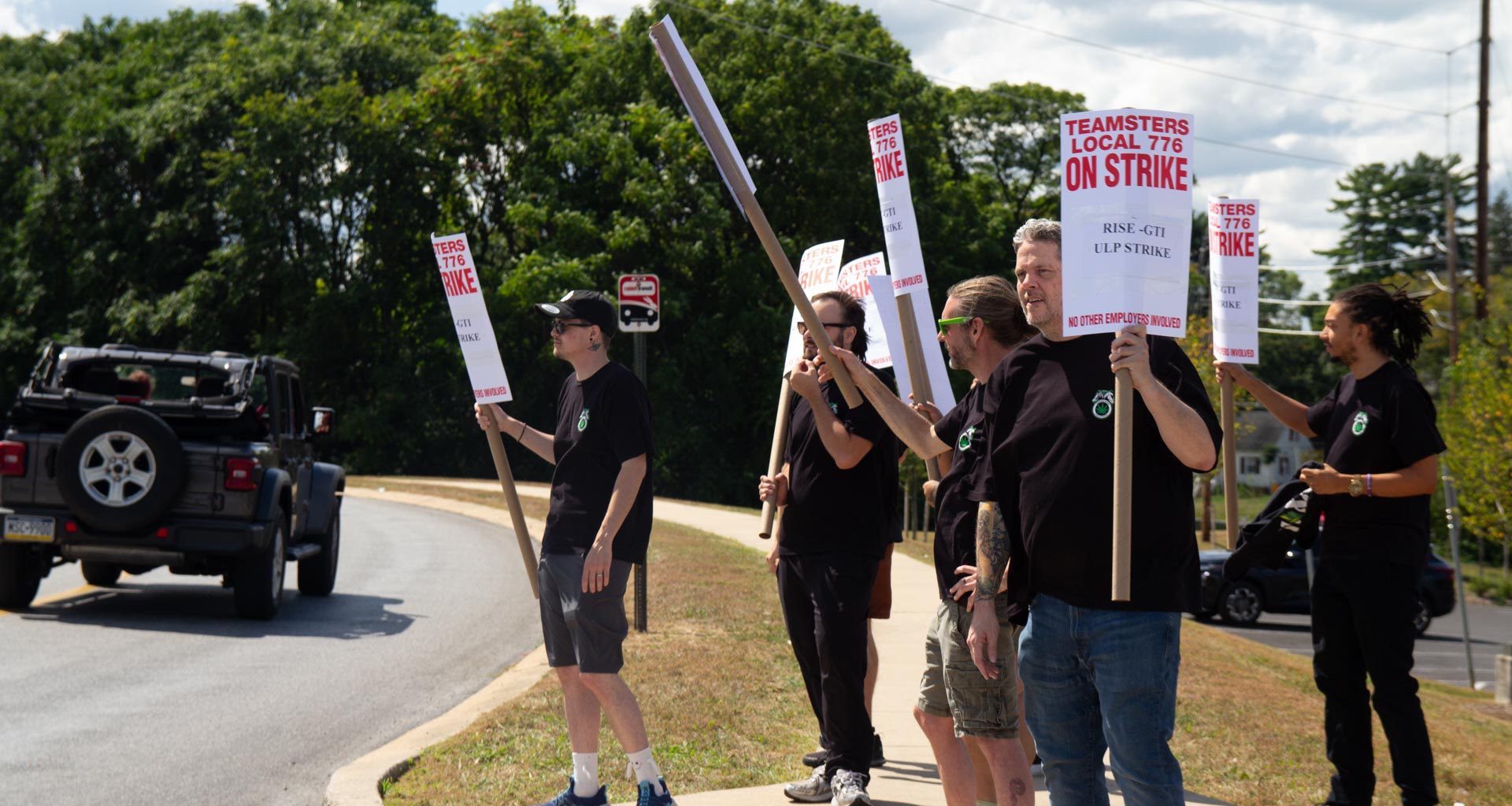Separate, ongoing strikes at cannabis businesses in two states are now the longest work stoppages in the history of the country’s $32 billion legal marijuana industry.
As actors in both situations push the Trump administration to step in, overall conditions in both the cannabis industry and the larger American economy suggest more unrest could follow despite a worsening scenario for workers in certain markets, observers say.
The two strikes are at:
- Exclusive Brands in Ann Arbor, Michigan, a vertically integrated operator active only in that state that began Aug. 28.
- Profitable marijuana multistate operator Green Thumb Industries’ (GTI) RISE location in York, Pennsylvania, that started Sept. 1.
An uncoordinated coincidence, the simultaneous stoppages – already more than a week longer than the previous-longest 13-day strike in April 2023 – differ widely.
A small band of Exclusive Brands workers called a strike in part because management refuses to recognize a union election, while the unionized RISE workers voted to strike after more than a year of contract negotiations.
“The former is focused on educating the public and getting media attention for their cause, the latter is interrupting business as a leverage in negotiations,” said Maggie Gray, a political science professor at Adelphi University in Garden City, New York, who’s published on labor issues.
“So these strikes have different goals,” she added.
“What they do have in common is that there is saturation in the cannabis market.”
Marijuana industry strikes, marijuana industry struggles
Once seen as organized labor’s best chance for growth in decades after a long decline, the cannabis industry’s recent struggles suggest that there’s less in the way of profits or resources for management and workers to fight over.
At the same time, a relatively tight labor market and continued steady increase in the costs of housing, groceries and other goods mean workers are likely to agitate for higher wages or seek other employment if compensation doesn’t keep track, observers said.
And in the case of Pennsylvania, the strike comes in what most cannabis operators agree are ideal conditions for profitability: a limited-license market.
The strikes also come during a period of relative stagnation for union efforts following a flurry of organizing activity under the Biden administration.
In several states, cannabis workers have voted to de-unionize after organization efforts failed to produce better pay and conditions.
Critics say that’s partially because marijuana companies have successfully squashed unions using tactics employed in other sectors.
And the return of President Donald Trump and a staunchly pro-business agenda to Washington means more employers may feel emboldened to oppose organizing efforts – and to use a pro-business National Labor Relations Board to rewrite Biden-era rules.
First cannabis worker strikes in Trump era after Biden wins
That’s what union sympathizers say is happening in Ann Arbor, Michigan.
There, four employees of Exclusive Brands, organized by the United Food and Commercial Workers, went on strike Aug. 28 after company leadership allegedly fired a pro-union worker amid a unionization drive, according to the union.
“It’s just ironic because this company claims to stand for social equity but are denying that for its own workers,” said Emily Hull, a striking worker.
However, the vast majority remain on the job. The company publicly claims more than 200 are still working, though in federal filings Exclusive claims a total workforce of 125.
Exclusive Brands did not respond to a request for comment prior to publication.
In York, Pennsylvania, unionized workers at a location of RISE agreed to stop work on Sept. 1 after company officials refused to resume contract negotiations, said Mark Cicak, an organizer with International Brotherhood of Teamsters Local 776.
All eight workers in the bargaining unit, which unionized last summer, are on strike, he said.
Both strikes remained ongoing as of Wednesday.
The businesses remain open.
In a statement to MJBizDaily, a GTI spokesperson said the company’s “last, best and final offer included meaningful wage increases and comprehensive benefits” and is based on a “market analysis” of Pennsylvania’s medical-only industry.
Workers there start at $16 an hour and max out at $17.65, Cicak said.
They want a minimum starting hourly wage of $18, he said – exactly what striking Green Thumb workers in the Chicago area received after a 13-day strike in April 2023.
Two cannabis worker strikes in two very different marijuana markets
The two strikes come in two very different business environments.
Michigan’s relatively mature adult-use cannabis industry has no license caps.
Competition and market saturation means some operators are exiting as others scale back despite projected annual sales of as much as $3.89 billion for 2025.
In contrast, Pennsylvania’s robust $1.7 billion annual market remains medical only. It’s considered a top source of potential growth for the legal industry once lawmakers legalize cannabis for adult use.
In the meantime, the state’s limit on the number of permits allowed is what MSOs identify in regulatory filings as as the ideal operating conditions.
Appeals to Trump administration amid publicly traded revelations
As MJBizDaily reported, Exclusive Brands recently appealed to the National Labor Relations Board for a declaration that the business is illegal.
The hope is that the NLRB will find federal cannabis prohibition means that federal labor law doesn’t apply and workers can be fired for pursuing unionization, otherwise a legally protected activity.
Meanwhile, the Teamsters on Aug. 28 filed a complaint with the NLRB claiming GTI is refusing to bargain in violation of the federal National Labor Relations Act.
It’s unclear when the NLRB might be consider either case – or be legally able to make any decisions.
The Trump administration still needs to make appointments to the NLRB before it can function.
In the meantime, the York workers are prepared to stay out “as long as it takes,” the Teamsters’ Cicak said.
That’s partially because they know exactly how well publicly traded Green Thumb Industries is doing, he added.
In recent filings, the company reported annual revenue in excess of $1 billion.
Despite reporting a small loss in the second quarter of 2025 stemming from a sale – and outstanding debt of $250 million – Green Thumb is generally profitable.
And that’s information the workers share with RISE customers crossing the picket line, which they’ll hold until GTI returns with a better contract offer, Cicak said.
“This group is a smart group. They understand the cannabis industry,” he said.
“They know the cannabis industry is growing.” GTI’s profits “have to trickle down to the people who make these dispensaries operate.”
Subscribe to the MJBiz Factbook
Exclusive industry data and analysis to help you make informed business decisions and avoid costly missteps. All the facts, none of the hype.
What you will get:
- Monthly and quarterly updates, with new data & insights
- Financial forecasts + capital investment trends
- State-by-state guide to regulations, taxes & market opportunities
- Annual survey of cannabis businesses
- Consumer insights
- And more!
Cannabis capital-labor relations changing as industry matures?
Stalling negotiations so that pro-union workers lose interest or move onto other jobs is an age-old management tactic that cannabis companies have proven willing to use, observers say.
But in turn, unions might also have to adjust strategy to fit the marijuana industry’s current reality, said Sarah Stith, a professor of economics at the University of New Mexico who’s studied marijuana legalization’s effects on employment.
“The vast majority (of cannabis workers) are low-skilled workers,” she said. “They could be working at a Starbucks or at the dispensary.”
Low-skill workers are more easily replaceable and have less bargaining leverage, she said.
And saturated markets such as Michigan may have more cannabis businesses than can be supported.
“The ability to extract rents out of those dispensaries may not be worth the cost of organizing a union,” she added.
Chris Roberts can be reached at chris.roberts@mjbizdaily.com.
Medical Disclaimer:
The information provided in these blog posts is intended for general informational and educational purposes only. It is not a substitute for professional medical advice, diagnosis, or treatment. Always seek the advice of your physician or other qualified healthcare provider with any questions you may have regarding a medical condition. The use of any information provided in these blog posts is solely at your own risk. The authors and the website do not recommend or endorse any specific products, treatments, or procedures mentioned. Reliance on any information in these blog posts is solely at your own discretion.






